| Dr. Melanie Koss is a professor of children’s and young adult literature at Northern Illinois University just outside of Chicago. Her research focuses on representations of diversity in children’s and young adult literature, as well as explores issues of teacher autonomy over the literature they bring into their classrooms. She is currently a committee member for the Sydney Taylor Book Award. |
First, I had a group of students who stayed after class one day to ask me what a Jew was. I teach an exploration of diversity in children’s and young adult literature and am open about my diverse heritage and being Jewish. Their small group had been talking, none of them really knew what a Jew was, but they all had negative connotations about Jewish people. They were trying to reconcile what they thought they knew about Jewish people to me, someone who they told me did not match their assumptions.
Then, a colleague and dear friend of mine was visiting me. Over dinner, the conversation included discussion about my growing unease as a Jewish person in the U.S., and she asked me what I was afraid of. That question stopped me in my tracks. That was the very day Kanye West made his antisemitic rant on Twitter that spurred on the “Ye is Right” Antisemitic Campaign. Kanye has more Twitter followers (over 30 million) than there are Jews in the world (14.8 million). Encouraging antisemitic hate and violence poses a very real risk in my world. There’s a lot that I’m afraid of.
These are two experiences, among many, that have made it clear to me people have little knowledge and a lot of misconceptions about who Jewish people are, and even less understanding of the dangerous position we are in, both historically and today.
Antisemitism, simply defined as a hatred of Jews as individuals and/or as a group, is on the rise. According to the Anti-defamation League, there has been a 36% increase in incidents in the last year with 128% rise in the Midwestern state where I live. It is very scary to be a Jew in the U.S. these days, especially because we are few in number and so many misconceptions about us exist.
Unfortunately, there are few YA books that address antisemitism. People don’t want to talk about antisemitism, but silence allows for violence and erasure. We talk about hate and bias toward other marginalized groups, and it’s time to include Jewish people and Jewish topics into the conversation.
Please share books with Jewish content with your students and encourage learning and conversation. Some things to think about include:
- Humanize Jewish people
- Make sure you have books with Jewish people that are about more than just holidays, history, or The Holocaust.
- Portray a variety of Jews, as we’re a very diverse people. Not all Jews are White and descents of Eastern Europe. There are Jews of color; LGBTQ+ Jews; Ashkenazi, Sephardic, and Mizrahi Jews; Orthodox, Conservative, Reform, and Atheist Jews; interfaith Jews; biracial Jews; the list goes on.
- Separate American Jews from Israel. That is a separate and complex issue, and one not all Jews in the U.S. agree on.
- Separate Jews from religion. Some Jewish people practice Judaism, but many identify as Jews who are not religious.
Below, I share some titles that tackle antisemitism and invite critical conversation.
| Based on a true story, The Assignment by Liza Wiemer portrays events that occurred after a high school teacher assigned students to debate the Final Solution, the Nazi plan for exterminating Jews. Seniors Logan and Cade were uncomfortable with the assignment and disturbed that some classmates began giving the Nazi salute. With both support and opposition from their classmates, faculty, and the community, Logan and Cade used various strategies to have their concerns heard as they worked to get the debate canceled. Given that this book was written in response to an actual assignment given a few years ago, it is a powerful reminder that Holocaust bias and acts of curriculum violence against Jewish people occur and must be called out. It allows teachers to examine their own lessons for possible unintentional curriculum violence, and aids in teaching students how to speak up when they see injustices perpetrated in their world. A curriculum guide and link to a crowd-sourced teaching idea doc are available on her website. |
| Sarah Darer Littman’s book Some Kind of Hate is a powerful novel about how easy it is to become radicalized online, believe conspiracy theories, and align with hate groups. The novel is told from the alternating points of view of the two main characters, best friends Declan and Jake. After star pitcher Declan suffers a career-ending injury, he spirals into a severe depression and allows anger to rule his world. He gets indoctrinated and radicalized online and becomes a member of a white supremacist, neo-Nazi group involved in planning acts of domestic terrorism. Declan is taught to hate all Jewish people, and internally struggles as Jake is Jewish. This book is a must read but is a hard read. Extensive resources, including a glossary, educator links, and links to media bias and fact checking sites are available on Sarah Darer Littman’s website. |
| The UK’s first YA novel on antisemitism, What We’re Scared Of by Keren David, tells the story of Evie and Lottie, twins who could not be more different. Although their mother is Jewish, their heritage was not a large part of their upbringing, and they lived a secular life. When their mother, a morning radio show host, begins denouncing antisemitism on air, a combination of events result that force the twins to learn about their Jewish heritage and confront the dangers of antisemitism head on. A wide cast of Jewish characters portray different aspects of being Jewish, alongside characters who promote antisemitic conspiracy theories and express Jewish hate. Toward the end of the novel, David includes the words of a Holocaust survivor, linking historical and contemporary acts of hate. Readers will see how easy it is for secular Jews who may not even consider themselves Jewish to become targets of hate. Outright and subtle forms of antisemitism are included, allowing for nuanced research and discussion of stereotypes, myths, misconceptions, and inaccuracies. |
| Yes No Maybe So by Becky Albertalli and Aisha Saeed is a romance between two teens, Jamie who is Jewish and Maya who is South Asian and Muslim. The two are paired together to canvas for an upcoming election, and neither is looking forward to working together. As antisemitic memes appear simultaneous to the proposal of Islamophobic laws banning Hijabs, Jamie and Maya unite to fight bigotry targeting both of their identities. Set in today’s sociopolitical world and based on the Georgia special election, the novel centers on political activism. It allows for rich discussion of political advocacy alongside fighting hate against Jews and Muslims. The authors include authentic elements of both Jewish and Muslim cultures and highlight cultural differences to present rounded characters. |
| Another contemporary romance, Rachel Lynn Solomon’s Today Tonight Tomorrow, follows Rowan and Neil, two Jewish high school rivals, who competing in their school’s senior scavenger hunt. When they learn that others are out to beat them, the two reluctantly team up. Although this novel is light and fun, there is a subplot of causal antisemitism that provides fodder for discussion. Authentic Jewish content is embedded, and the novel dispels stereotypes that all Jewish people are White and wealthy by portraying Rowan, a Jew of Mexican heritage with an immigrant parent, and Neil, whose parents are struggling financially. The perils of being Jewish in contemporary society is an underlying theme, with the teens sharing the different ways their Jewish identities have impacted their lives. |
- Eight Nights of Flirting by Hannah Reynolds
- Little & Lion by Brandy Colbert
- Cool for the Summer by Dahlia Adler
- Kate in Waiting by Becky Albertalli
- The Last Words We Said by Leah Scheier
Resources
- Sydney Taylor Book Award
- Sydney Taylor Shmooze blog
- Jews Don’t Count by David Baddiel
- The Book of Life podcast and blog with resources for speaking up and promoting justice
- Evaluating Jewish Representation in Children’s Books guide
- 90 Ways to Respond to Antisemitism list
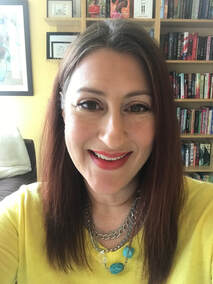
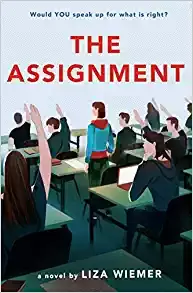
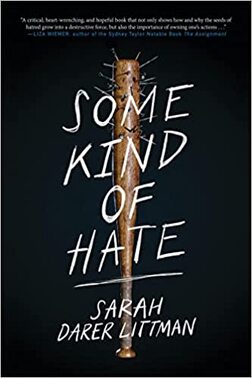
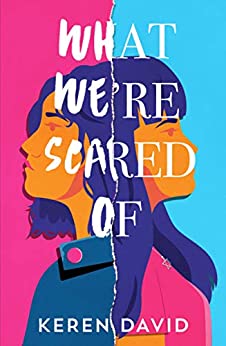
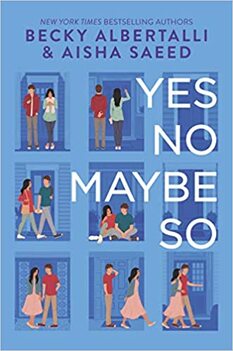
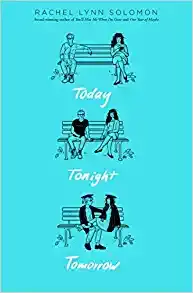

 RSS Feed
RSS Feed